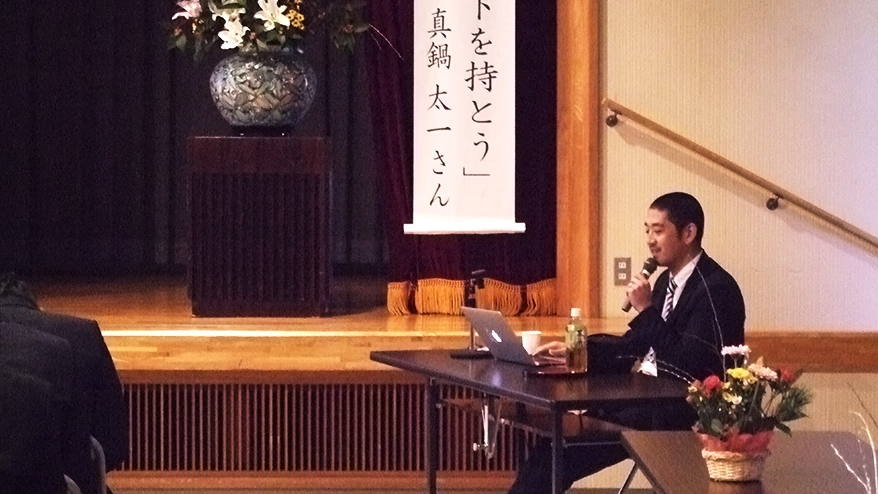Hello. I am Manabe, Director of the Production Department/Manager of the Food Hub Project .
The Coming of Age Ceremony in Kamiyama Town, Tokushima Prefecture, where I currently live with my family, was held on January 2nd of this year. At the end of last year, I was asked by the Kamiyama Town Board of Education to give a speech at the ceremony, and although I was quite anxious about whether I was the right person to do so, I accepted, thinking that I could be of some use to the town.
However, I had no idea what to talk about, and to be honest, I was quite worried. Then I suddenly remembered what our CEO, Hayashi, had said, "Let's have our own project." I thought this content might be useful for people who are about to enter society, so I added my own interpretation and spoke at the Coming of Age Ceremony.
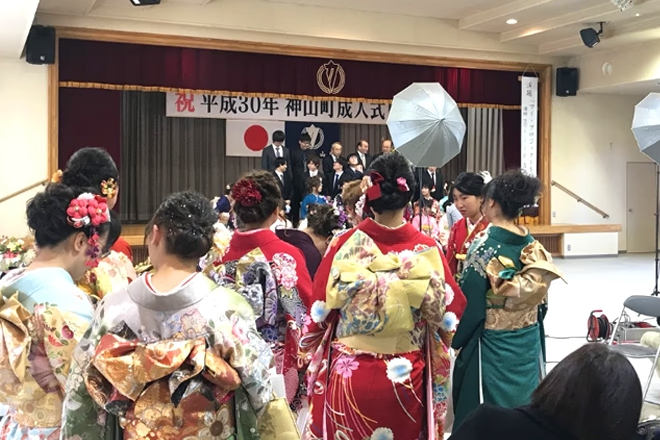
My conclusion is that it didn't seem to be that well received by the 20-year-olds (lol), but today I'd like to briefly introduce what we talked about there.
What is the “project” in the Food Hub Project?
First, I gave a brief explanation of the Food Hub Project, then explained what the ``project'' in the Food Hub Project refers to, and then moved on to talking about my own project.
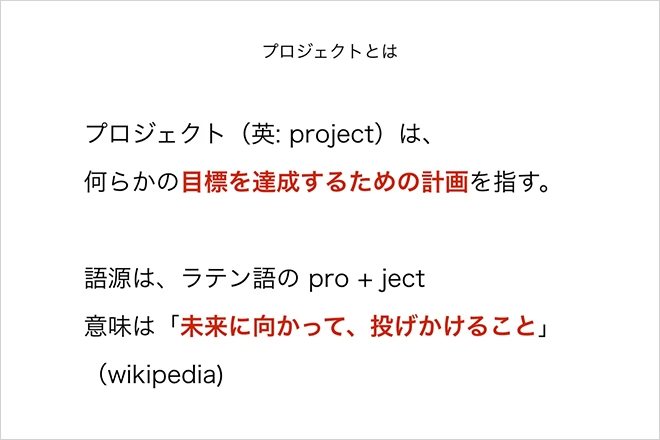
A project is a plan for achieving some goal.
The word originates from the Latin pro + ject. It means "to cast something toward the future."
According to Wikipedia, this is the definition:
If we replace that with a food hub, it looks like this.
The Food Hub Project is not a profit-seeking company.
We are a company that aims to achieve a social goal for the future: to pass on local agriculture to the next generation.
Of course profit is important, but it is not Food Hub's primary goal, so we have deliberately focused on this and included the word "project" in our company name.
Going off topic a bit, now that I've moved to Kamiyama, I'm often asked, "How many years will you run Food Hub?" (The underlying question seems to be that you'll go to another place.) If I were to answer, "I intend to stay here forever!" it would sound like a lie...or rather, it's a lie. That's why I don't say it. Because I think "intend" is an irresponsible word.
The honest answer is, "I don't know."
I may do it forever, or I may not.
Rather than becoming a personal entity such as "I = food hub," I would like to continue being involved until the food hub itself can sustain itself in a healthy manner.
That's what I really think, but in reality, I answered, "I'll do it for 10 years."
From there, he may or may not be in this town.
When I say 10 years, everyone says, "I see, 10 years."
For most people, 10 years seems like a surprisingly reasonable number.
The reason for 10 years is that it has been 10 years since the company was founded (in 2016), and my daughter (currently in the fourth grade of elementary school) will graduate from high school. Currently, Food Hub is also involved in revising the curriculum of the only high school in Kamiyama Town (an agricultural high school). I don't know if my daughter will attend that school, but I am working on it with the secret hope that she will attend and graduate from a high school that we are involved in.
Involving yourself in the activities of the food hub, which is your job, while also bringing your "personal feelings" to the table. Going a step further than simply being involved as part of your job, and becoming actively involved. I think this kind of approach can be called "my project."
So, life is a project too!
If "my project" refers to the process of incorporating personal ideas into work, then I believe that one's life can also be considered a project.
So, if you think of life as a project, what would you like to make into a "project" in your life? What would you like to project into the future with a plan in mind?
To live? (This is important in itself.)
To make money? (That's a bit sad.)
A rich life? (That's too vague.)
I said that if we look at life more objectively, we might think about it in the following way.
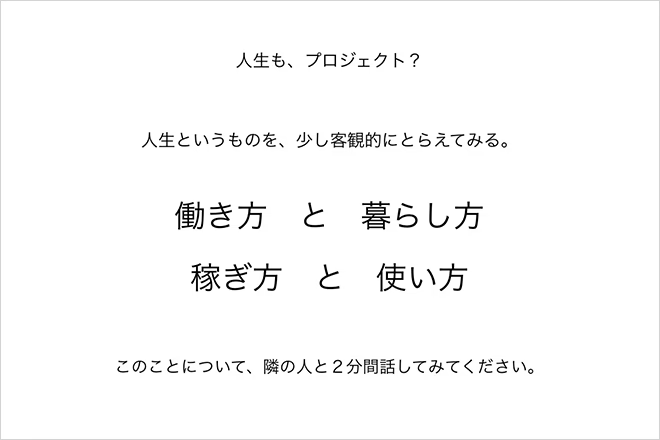
As we always say at Monosus, I think that, in one aspect, life is a process of repeatedly training and discussing "how to work and how to live," or in other words, "how to earn money and how to spend it."
"Earn a lot of money and spend a lot" is one way of life, but "make a decent amount and solve problems with your own hands while spending as little as possible" is also an option. We said that the reason we created a satellite office in Kamiyama was to increase the options for how to work and live, how to earn and spend money.
A project, a life.
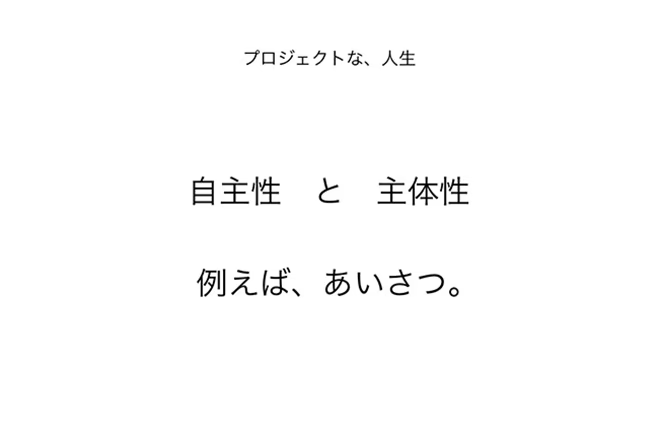
When you think of life as a "project," it's important to be aware of the difference between "independence" and "initiative." I myself have lived my life up until now without being clearly aware of this difference.
For example, let's take greetings.
- No, no, I say hello.
- Voluntarily say hello.
- Be proactive and say hello.
Let me explain the differences between these three.
1. No, no, say hello.
This is out of the question
2. Greet people voluntarily.
Being independent means already knowing clearly what you need to do and taking the initiative to do it before being told to do it by someone else.
Most people know that it is better to greet someone when they meet them. In other words, someone who takes the initiative to greet others cheerfully every morning is a person who has "independence." Taking the initiative to clean up can also be said to be a sign of independence.
3. Take the initiative to greet others.
Being proactive means thinking, judging, and acting on your own, even when you have not yet decided what to do. For example, being proactive in "greeting"...
A person who thinks that "greetings" alone are not enough to strengthen their team (rethink the purpose), and thinks it would be better to "shake hands" when saying goodbye in the morning and when leaving work, and calls on his team to take action, can also be said to be "proactive."
(You may be annoying like me sometimes lol)
What I wanted to say is that in order to treat life as a project and act accordingly, it is not enough to have the "autonomy" of acting on a set of "things to do" that someone has clearly defined in advance; you also need the "initiative" to think, judge, and act for yourself based on your goals.
Is there really no place to demonstrate initiative?
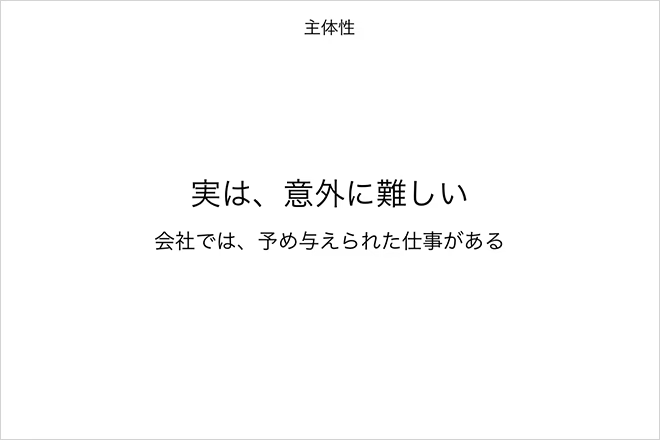
I have said that initiative is necessary, but in fact, it may be surprisingly difficult to demonstrate "initiative" in society.
In many cases, whether at school or work, the things you have to do are clearly defined, and in most cases, your time is filled with things you have to do. I think the current situation is that even if you want to exercise your independence, there is no place where you can do so.
That's why I would like to introduce the "20% rule."
Google's 20% rule
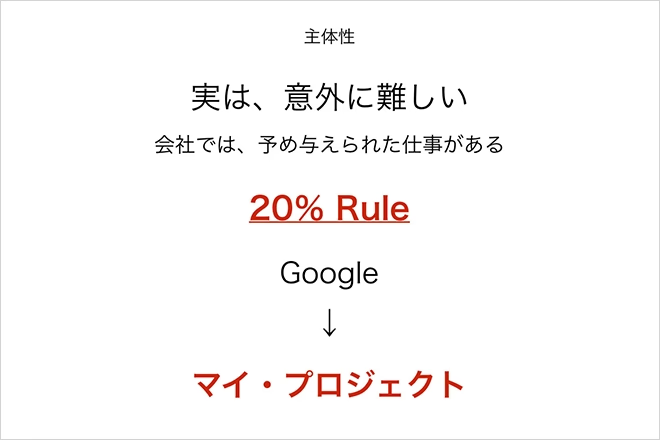
Google, a client with whom we have worked on projects for many years, has a number of great internal rules.
One of them is the "20% Rule."
The rule is that you can spend 20% of your time at work doing things you like.
I don't know how exactly the 20% rule is applied, but I have come across many instances where the 20% rule is being put to use, such as someone taking the initiative to start their own research project for 20% of their time, which then gets adopted as an actual product, or someone saying, "Please help me with my new project with 20% of my time!", resulting in movement that transcends organizational boundaries.
We understand from the start the characteristics of corporate organizations and work, where it is difficult to demonstrate anything other than "autonomy," and we have incorporated a system in the form of the "20% Rule" that allows employees to demonstrate "initiative" within those environments.
I think strong companies are definitely different.
I think that in a company like this, it would be possible to exercise "autonomy" and "initiative," but usually, this is not possible unless you start your own company and become the manager. Both Monosus and Food Hub are small companies that are not even close to the size of Google, but we are currently trying various things to see if we can incorporate a place where team members can exercise "initiative" into the organizational structure.
I think the idea of "my project" can be useful in such situations.
For example, at Monosus, we allow side jobs as long as they are not in the same industry. In the past, we have had people who toured the country while playing in professional bands, and people who run galleries on weekends. I think these are also forms of my own projects.
My own project
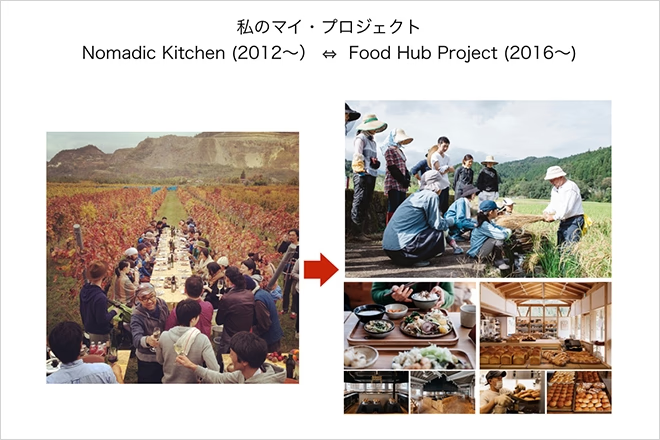
Now I would like to look back on my own project.
The food project " OPEN harvest " that I carried out in November 2011 was a project that gave me the opportunity to fully exercise my "autonomy" while being given a purpose and meaning by Mr. Tanigawa, the representative of JTQ Inc. , where I worked at the time.
The following year, I started a food community project called " Nomadic Kitchen " with other chefs, led by Nomura Yuri of eatrip , without anyone asking me to. We've been continuing the project to this day, using paid leave and our restaurant's closed days, with our own expenses and income from events. I think this is where my project began.
Based on the activities of Nomadic Kitchen, it has developed from a project that was just for me to a food hub project that is filled with the ideas of many more people.
How to start my project.
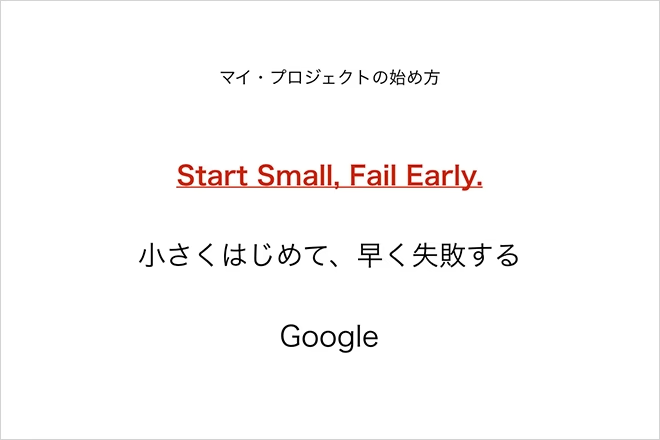
So how do I start my own project?
Here I've introduced some ideas that may help you out a little bit.
Again using Google as an example, here’s a way of thinking about it:
Start Small, Fail Early.
Start small, fail fast
When you hear the word "project," you might imagine something big and impressive, but the important thing is to start quickly, small, and fail quickly. It's important to have small successes and use them to move on to the next step.
The next important thing is spirituality.
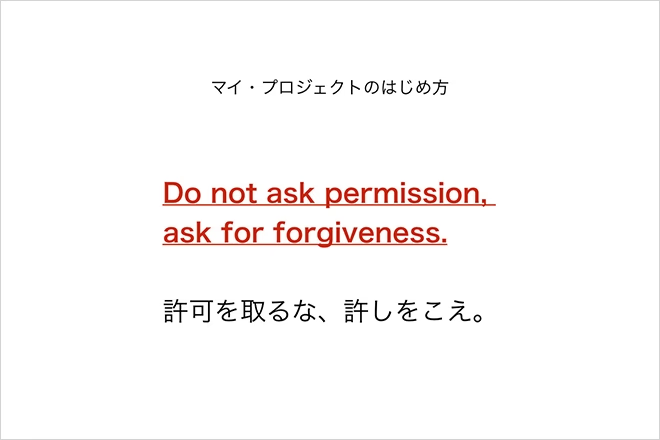
Don't take permission, don't take permission.
I don't remember where I first heard it, but I think it's related to the previous point, "Start small, fail fast." Instead of getting permission every time and hedging your risk, if you try something and fail, you can just say "I'm sorry" ≒ ask for forgiveness.
Of course, the first prerequisite is that it has a positive effect on relationships with society and the organization, but I think it would be easier to create my own project if society and company superiors were to openly accept this kind of thinking and behavior.
My own project in life.
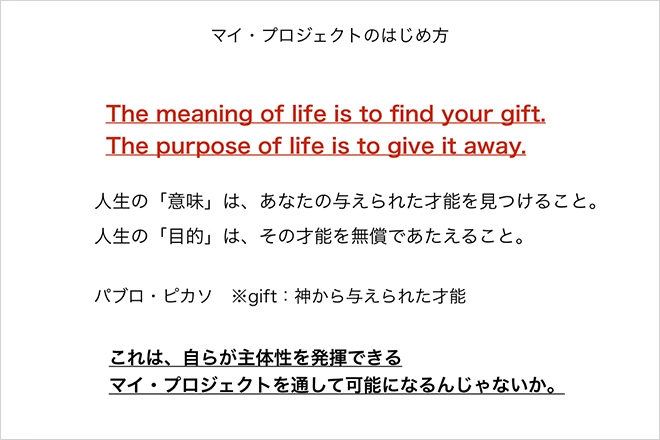
The meaning of life is to discover the talents you have been given.
The "purpose" of life is to give away your talents freely.
This is a famous quote by Pablo Picasso that has had a huge impact on the way I live my life.
When I was young, I was constantly troubled by the discrepancy between what I wanted to do and what I had to do as a job. But now I think that I may have mistakenly thought that "what I want to do" was the same as my talents and what I was good at.
In English, "talent" is called "GIFT."
Talent is something that is given to us by an invisible power. If we compare life to a project, I think the essence of My Project is to find that "talent" that has been given to us through the project and give it back to society free of charge.
I hope that everyone will find their own "GIFT" and take the initiative in enjoying life.
So, I thought I had done my best to explain it, but it may not have resonated with the 20-year-olds (laughs). My wife told me, "The higher-ups in the company often talk like this," but I think it was a great opportunity to reflect on who I am now.
Finally, I would like to once again express my gratitude to the people of Kamiyama Town for giving me this opportunity.
Before my lecture, the mayor lightly pressured me by saying, "Whether or not many of these kids stay in Kamiyama depends on what you say, lol." Later on, I gradually realized that he had welcomed me as a member of the town, and I was really happy.
Thank you so much to everyone involved in Kamiyama Town!
We wish all the new adults the best of luck in their future endeavors!
